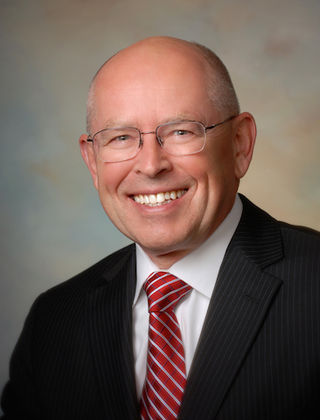
From the earliest days of the Christian faith, Christians have viewed marriage as a divinely blessed, lifelong, monogamous union between a man and a woman. However, while many Christians might agree with the traditional definition, the terminology and theological views of marriage have varied through time in different countries, and among Christian denominations.
Christian fundamentalism, also known as fundamental Christianity or fundamentalist Christianity, is a religious movement emphasizing biblical literalism. In its modern form, it began in the late 19th and early 20th centuries among British and American Protestants as a reaction to theological liberalism and cultural modernism. Fundamentalists argued that 19th-century modernist theologians had misunderstood or rejected certain doctrines, especially biblical inerrancy, which they considered the fundamentals of the Christian faith.

Wayne A. Grudem is a New Testament scholar turned theologian, seminary professor, and author. He co-founded the Council on Biblical Manhood and Womanhood and served as the general editor of the ESV Study Bible.

The Southwestern Baptist Theological Seminary is a Baptist theological institute in Fort Worth, Texas. It is affiliated with the Southern Baptist Convention. It was established in 1908 and in 2005 was one of the largest seminaries in the world. It is accredited by the Association of Theological Schools in the United States and Canada, the Southern Association of Colleges and Schools Commission on Colleges, and the National Association of Schools of Music to award diplomas and bachelor's, master's, and doctoral degrees.

Christians for Biblical Equality (CBE) is an organization that promotes Christian egalitarianism and is headquartered in Minneapolis, Minnesota. CBE's Mission Statement reads: "CBE exists to promote biblical justice and community by educating Christians that the Bible calls women and men to share authority equally in service and leadership in the home, church, and world." According to its website, CBE "is a nonprofit organization of Christian men and women who believe that the Bible, properly interpreted, teaches the fundamental equality of men and women of all ethnic groups, all economic classes, and all age groups, based on the teachings of Scriptures such as Galatians 3:28: 'There is neither Jew nor Gentile, neither slave nor free, nor is there male and female, for you are all one in Christ Jesus' ."

The Council on Biblical Manhood and Womanhood (CBMW) is an evangelical Christian organization promoting a complementarian view of gender issues. According to its website, the "mission of The Council on Biblical Manhood and Womanhood is to set forth the teachings of the Bible about the complementary differences between men and women, created equally in the image of God, because these teachings are essential for obedience to Scripture and for the health of the family and the church." CBMW's current president is Dr. Denny Burk, a professor of biblical studies at Boyce College and director for The Center for Gospel and Culture at The Southern Baptist Theological Seminary. Its 2017 "Nashville Statement" was criticized by egalitarian Christians and LGBT campaigners, as well as by several conservative religious figures.
L. Paige Patterson served as the fifth president of Southeastern Baptist Theological Seminary in Wake Forest, N.C., from 1992 to 2003, as president of the Southern Baptist Convention (SBC) from 1998 to 2000, and as the eighth president of the Southwestern Baptist Theological Seminary in Fort Worth, Texas, from 2003 until his firing in 2018. He played a major role in the Southern Baptist "conservative resurgence", called "Fundamentalist Takeover" by opponents. He has been alternately described as a fundamentalist and a conservative evangelical.

Complementarianism is a theological view in some denominations of Christianity, Rabbinic Judaism, and Islam, that men and women have different but complementary roles and responsibilities in marriage, family life, and religious leadership. Complementary and its cognates are currently used to denote this view. Some Christians interpret the Bible as prescribing complementarianism, and therefore adhere to gender-specific roles that preclude women from specific functions of ministry within the community. Though women may be precluded from certain roles and ministries, they are held to be equal in moral value and of equal status. The phrase used to describe this is "ontologically equal, functionally different".

Russell D. Moore is an American theologian, ethicist, and preacher. In June 2021, he became the director of the Public Theology Project at Christianity Today, and on August 4, 2022, was announced as the magazine's incoming Editor-in-Chief.

Christian egalitarianism, also known as biblical equality. Christian egalitarians believe that the Bible advocates for gender equality and often allows women to be a part of the clergy. In contrast to other views such as complementarianisim and Christian patriarchy Egalitarians believe in a form of mutual submission in which all people submit to each other in relationships and institutions as a code of conduct without a need for hierarchical authority.

The roles of women in Christianity have varied since its founding. Women have played important roles in Christianity especially in marriage and in formal ministry positions within certain Christian denominations, and parachurch organizations. In 2016, it was estimated that 52–53 percent of the world's Christian population aged 20 years and over was female, with this figure falling to 51.6 percent in 2020. The Pew Research Center studied the effects of gender on religiosity throughout the world, finding that Christian women in 53 countries are generally more religious than Christian men, while Christians of both genders in African countries are equally likely to regularly attend services.
The Danvers Statement is a statement of the complementarian Christian view of gender roles. It is not the product of any particular Christian denomination, but has been cited by the Southwestern Baptist Seminary, the Presbyterian Church in America, and the International Council for Gender Studies. It was first published by the Council on Biblical Manhood and Womanhood (CBMW) in Wheaton, Illinois in November 1988. Work on the statement began with "several evangelical leaders" at a CBMW meeting in Danvers, Massachusetts in December 1987. In 1989, a paid advertisement center-spread appeared in the January 13 issue of Christianity Today accompanied with the Danvers Statement.
George William Knight III was an ordained minister in the Orthodox Presbyterian Church. He was a theologian, author, preacher, churchman, and adjunct professor of New Testament at Greenville Presbyterian Theological Seminary in Taylors, South Carolina. Formerly, he was the founding Dean and Professor of New Testament at Knox Theological Seminary. Prior to his appointment at Knox Theological Seminary, he taught New Testament and New Testament Greek at Covenant Theological Seminary in St. Louis, Missouri. As a pastor, he planted Covenant Presbyterian Church in Naples, Florida and has served numerous other local churches in the Presbyterian Church in America and the Orthodox Presbyterian Church. A former president of the Evangelical Theological Society, he has also taught and preached the Bible at many other seminaries and churches around the world. He has authored several works, most notably The Pastoral Epistles and a short commentary of Timothy and Titus as included in the Baker Commentary on the Bible. He received his theological doctorate from Free University of Amsterdam in 1968. Dr. Knight was a member of the General Assembly-appointed Ad Interim Committee to study the number of ordained offices in the Presbyterian Church in America according to Scripture. His Ad Interim Report of the Number of Offices by George W. Knight IIIArchived 2011-09-27 at the Wayback Machine was incorporated into the polity of the Presbyterian Church in America. He also served on an ad interim committee to study the issue of marriage, divorce and remarriage, which brought about the 1992 publication of a Position Paper of the Presbyterian Church in America on Remarriage and Divorce, 1992.Archived 2011-09-27 at the Wayback Machine.
New Calvinism, also known as the Young, Restless, and Reformed Movement, is a movement within conservative Evangelicalism that reinterprets 16th century Calvinism under contemporary US values and ideologies.

Biblical patriarchy, also known as Christian patriarchy, is a set of beliefs in Evangelical Protestant Christianity concerning gender relations and their manifestations in institutions, including marriage, the family, and the home. It sees the father as the head of the home, responsible for the conduct of his family. Notable people associated with biblical patriarchy include Douglas Wilson, R. C. Sproul, Jr., Voddie Baucham, the Duggar family, and Douglas Phillips.

Rachel Held Evans was an American Christian columnist, blogger and author. Her book A Year of Biblical Womanhood was a New York Times bestseller in e-book non-fiction, and Searching for Sunday was a New York Times bestseller nonfiction paperback.
Dorothy Kelley Patterson was most recently professor of theology in women's studies at Southwestern Baptist Theological Seminary. She is married to former SWBTS president Paige Patterson.
Kevin N. Giles is an Australian evangelical Anglican priest and theologian who was in parish ministry for over 40 years. He and his family live in Melbourne, Australia. Giles studied at Moore Theological College in Sydney, Durham University, England and Tubingen University, Germany. He has a Doctor of Theology degree from the Australian College of Theology.
Susan T. Foh is an American biblical scholar who studied at Wellesley College and Westminster Theological Seminary. She is the author of "Women and the Word of God: A Response to Biblical Feminism" (1978). Foh is best known for her 1975 article, "What Is the Woman's Desire?", in which she argues that the "desire" mentioned in Genesis 3:16 is actually a desire to dominate. Foh's interpretation has been very influential, especially among complementarians. Daymon Johnson considers Foh as one of four "Reformed neo-traditionalist" women who have made a significant contribution to American fundamentalism.
The Nashville Statement is an evangelical Christian statement of faith relating to human sexuality and gender roles authored by the Council on Biblical Manhood and Womanhood (CBMW) in Nashville, Tennessee. The Statement expresses support for marriage between one man and one woman, for faithfulness within marriage, for chastity outside marriage, and for a link between biological sex and "self-conception as male and female". The Statement sets forth the signatories' opposition to LGBT sexuality, same-sex marriage, polygamy, polyamory, adultery, and fornication. It was criticized by egalitarian Christians and LGBT activists, and several conservative religious figures.







